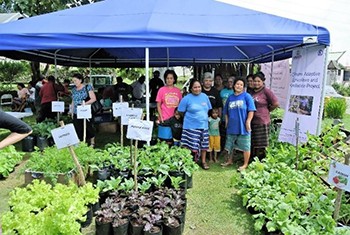Press Release Shim
Speeches Shim

For Immediate Release
Yap, Federated States of Micronesia - The United States Agency for International Development (USAID) recently marked the completion of a partnership that has helped make atoll communities in Yap, Federated States of Micronesia, more resilient.
In March 2015, USAID, through its Pacific-American Climate Fund, collaborated with the College of Micronesia-Federated States of Micronesia to train four atoll communities who have resettled on Yap Island in soil management, resilient gardening, and water harvesting techniques to improve their food security and livelihoods.
The communities were originally from the outer islands of Yap State and were forced to move mainland due to intense natural disasters and saltwater intrusion, making subsistence farming more challenging. Unfortunately, the resettlement areas on Yap Island were also not suitable for farming.
To address this challenge, USAID and the College of Micronesia trained communities with various techniques to improve the soil condition in the resettlement areas. As a result, 120 households have established home gardens that provided the atoll communities with nutritious and reliable food sources despite challenging conditions. These gardens also became source of additional income for families as they sold their surpluses to restaurants in Yap.
“We are growing our own food just as we once did (on our island),” proud home gardener Romina Lemaisaf said.
The atoll communities sold their produce at the World Food Day and Yap Day celebrations in the past two years, and the exposure gained them a steady clientele for their surplus. The latest Yap Day held last March 1-3 focused on food security and sustainability, showcasing the project as a good example.
USAID, through the project, also provided the home gardeners with portable rainwater harvest bags to address short water supply in the atoll communities. Equipped with faucets, the bags store 350 gallons of water, enough for people to take care of their daily domestic and gardening needs. The bags also allow people to access water in their backyards, relieving them of the daily task of fetching water.
“The U.S. government is proud to work with communities in addressing environmental challenges, and more importantly, to build their resilience as they face their increasingly unpredictable future,” said U.S. Ambassador to the Federated States of Micronesia Robert Riley.
In the Pacific Islands, USAID works with national governments, the private sector, academe, and nongovernment organizations to advance sustainable, resilient development. USAID assistance in the Pacific Island region covers 12 nations: Federated States of Micronesia, Fiji, Kiribati, Republic of the Marshall Islands, Nauru, Palau, Papua New Guinea, Samoa, Solomon Islands, Tonga, Tuvalu and Vanuatu.#

Comment
Make a general inquiry or suggest an improvement.